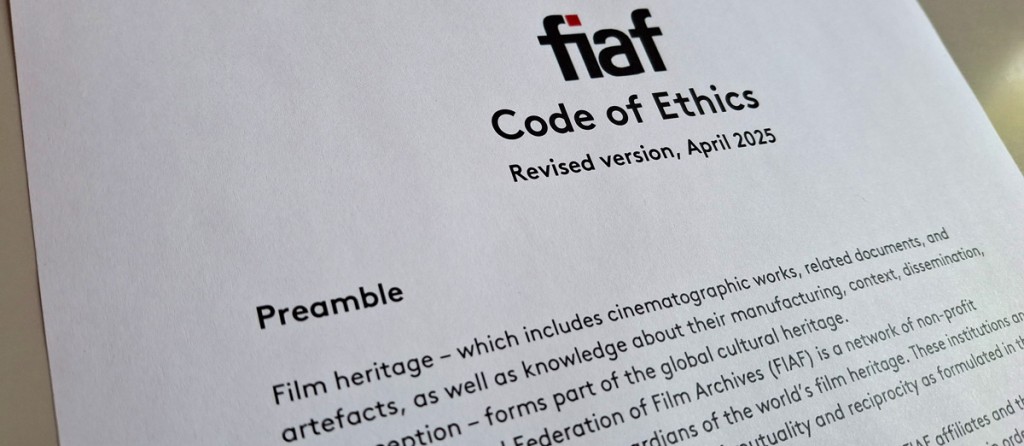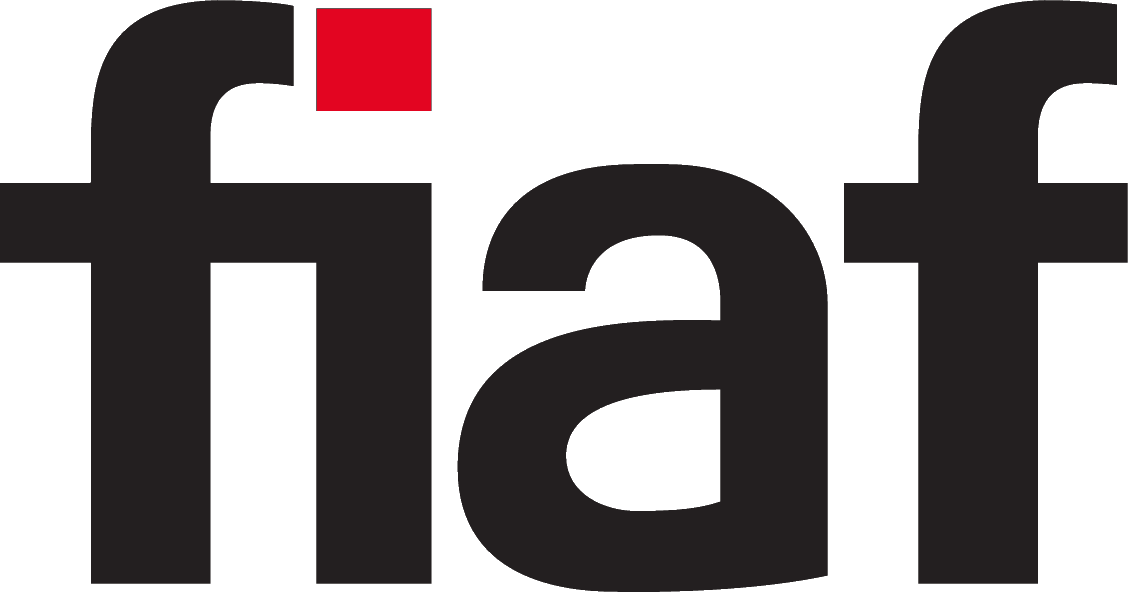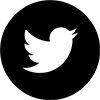
FIAF Code of Ethics
Revised version, April 2025
Preamble
Film heritage – which includes cinematographic works, related documents, and artefacts, as well as knowledge about their manufacturing, context, dissemination, and reception – forms part of the global cultural heritage.
The International Federation of Film Archives (FIAF) is a network of non-profit organizations, which are guardians of the world’s film heritage. These institutions and their staff collaborate on the basis of mutuality and reciprocity as formulated in the Federation's Statutes and Rules.
Acting with integrity and guided by professional criteria, FIAF affiliates and their staff recognize that their primary commitment is to protect this heritage in order to share it with present generations and to pass it on to posterity. FIAF affiliates have the obligation to make their collections available for study, exhibition, and public access, provided that these activities do not compromise this commitment.
FIAF affiliates, and those working in these institutions, have an obligation to treat all colleagues, creators, researchers, and members of the public with due respect, care, and dignity. FIAF affiliates will act responsibly towards people depicted or described in their collections, and towards communities, society, and the environment.
This Code of Ethics defines the principles and core values by which FIAF affiliates operate and outlines the expected professional practices by those employed in FIAF institutions.
1. Collections
1.1 It is the duty of FIAF affiliates to respect and safeguard the integrity of the collections in their care, including multiple versions, and to protect them from any forms of manipulation, distortion, falsification, or censorship. They will seek to document and preserve the historical, legal, administrative, and technological context of their collections and individual items.
1.2 FIAF affiliates will not compromise the long-term survival of the materials in their care in the interests of short-term exploitation. They will deny access rather than expose unique materials if these are thereby endangered.
1.3 FIAF affiliates will store all their collections in the best conditions available to them. If those conditions fall short of the optimum, they will strive to improve them. They should also engage with risk assessment and disaster preparedness.
1.4 When restoring or copying collection items, FIAF affiliates will not distort the work and will abide by the principle of reversibility. All decisions and interventions shall be faithfully documented and made accessible to the public.
1.5 When undertaking restoration work, affiliates will endeavour only to reduce the imperfections caused by handling or by the passing of time. Within the technical possibilities available, new preservation elements shall respect the characteristics of the original materials.
1.6 FIAF affiliates acknowledge the right of creators and rights-holders to make new versions of their works. However, when restoring, affiliates shall resist any temptation or pressure to deliberately modify the work. Creators’ intentions, formulated or not, cannot be used as an argument.
1.7 Restoration and reconstruction are not acts of creation. The result of such activities is not to be deemed a new work.
1.8 FIAF affiliates shall respect the public domain and advocate free use of public domain works.
1.9 FIAF affiliates will resist pressure to remove or destroy items in their collections, or to refuse or accept new items, for any reason outside their institutions’ collection policy.
1.10 FIAF affiliates will not unnecessarily destroy items, even when they have been preserved or protected by copying.
1.11 FIAF affiliates will exhibit their collections in a way that respects the authenticity of the original presentation and the technical characteristics of the work. They will aim to show works in their original formats.
1.12 FIAF affiliates will provide appropriate technical and historical information about the item exhibited or made available, especially when the work is not shown in one of its original formats.
2. Conduct
2.1 FIAF affiliates and those working in these institutions will act in a spirit of collaboration. They will treat colleagues in their own and kindred institutions with respect and cordiality and will fight any kind of prejudice or discrimination.
2.2 FIAF affiliates will provide a safe and secure working environment for their employees and their subcontractors and will take the necessary measures to ensure that their activities are not endangering their health.
2.3 FIAF affiliates will assure the professional competence of their staff and will strive to provide opportunities for regular training and professional development. They will ensure proactive sharing of knowledge and skills within their own and similar institutions.
2.4 FIAF affiliates shall ensure that their staff can freely express concerns. While affiliates’ staff have to follow the policies and procedures of their institution, they may properly object to practices that are perceived to be damaging to the collections, the institution itself, or the profession as a whole.
2.5 FIAF affiliates and those working in these institutions will not knowingly be party to false or misleading information and will not intentionally withhold information relating to their collections or areas of expertise (except where the confidentiality of a third party is involved).
2.6 Unattributed or unacknowledged use of the results of another entity’s or individual’s work or expertise, and breaches of trust, are deemed to be serious violations of professional standards.
2.7 FIAF affiliates and those working in these institutions will not misuse information or materials supplied to them. They will not copy materials belonging to another entity without permission.
2.8 When providing access to their collections, FIAF affiliates will respect current copyright legislation and intellectual property rights.
2.9 Staff working in a FIAF-affiliated institution shall not indulge in activities which may compete or conflict with those of their institution, such as building a private collection of materials overlapping with those collected by the institution, trafficking of collection items, accepting a financial interest or personal gain in an organization supplying goods or services to the institution, or obtaining services from it.
3. Community
3.1 FIAF affiliates acknowledge that their collections are a significant legacy and that their institutions work for the benefit of all.
3.2 FIAF affiliates shall promote trust, openness, freedom of speech, civility, diversity, tolerance, and respect. They should fight against any kind of discrimination, prejudice, and inequality.
3.3 FIAF affiliates shall give the widest possible access to collections and information about the collections. They will provide an impartial service to all.
3.4 Wherever possible and safe to do so, FIAF affiliates will allow access to the original items for research.
3.5 While observation of the principles listed in this Code may make it impossible to always provide access to collection items, FIAF affiliates and their staff acknowledge that the public has the right to make requests for access, and they are entitled to be treated with courtesy even when their requests cannot be satisfied.
3.6 FIAF affiliates should be mindful that their collections may contain works of cultural significance for the communities represented by or depicted in these works, or from which the works originate. They should actively seek collaboration with these communities in defining and promoting appropriate strategies to research provenance, preserve, contextualise, and provide access to these works.
3.7 FIAF affiliates should ensure that the dignity and moral rights of individuals depicted in materials in their collections are respected. Aware of the risk of misuse, FIAF affiliates will take this into careful consideration when curating, disseminating, or providing other forms of access, even if the works are in public domain or out of copyright.
3.8 FIAF affiliates acknowledge the importance of restitution of works and items to their communities or countries of origin, being aware that these works or items can be part of more than one cultural or national heritage. In a spirit of collaboration, they should initiate dialogue with these communities or countries and shall meet legitimate restitution requests, ensuring that the long-term preservation of the materials concerned is not compromised.
3.9 FIAF affiliates will refrain from acquiring archival material from territories with limited infrastructure. Lack of technical, human, and financial resources shall not be an excuse for more-affluent affiliates to appropriate and take over film heritage collections and items belonging to others.
3.10 In order to protect the environment and the community, FIAF affiliates will handle dangerous goods and health-hazardous material in a responsible way, and shall ensure that high standards of health, safety, and accessibility apply to everyone.
3.11 FIAF affiliates shall strive to reduce their environmental impact, and opt for sustainable solutions whenever possible.
Endnote
For its original inspiration, this document owes much to David Francis, who in 1993 first suggested that FIAF should produce a Code of Ethics, and that membership should be determined by adherence to such a Code rather than by conformity to formal definitions of the Statutes and Rules. The project is equally indebted to Ray Edmondson, who throughout the 1990s developed a Philosophy of Audio-Visual Archiving. Although neither was directly involved in writing the first version of the Code, their influence was essential and is gratefully acknowledged. The first Code of Ethics was drafted and edited by Roger Smither, in his role as Secretary-General of FIAF. It was refined through consultation, first in 1995/96, with Hoos Blotkamp, then head of the Working Group on the Future of FIAF, and later with Gabrielle Claes. In April 1997, the Code was considered in a brainstorming session by the Executive Committee, and discussed at the General Assembly in Cartagena, Colombia. The final text of the first version was written in partnership with Clyde Jeavons and adopted at the 1998 Congress in Prague.
Significant changes in our field and in society at large have made a revision of the Code of Ethics unavoidable. Initiated by Michael Loebenstein, in his role as Secretary-General, the project was submitted to and discussed by the Executive Committee. After studying the ethical guidelines of other global heritage associations and federations, the project for revision was presented and accepted by the community during the Second Century Forum (2CF) of the 2022 Congress in Budapest. To be as democratic and inclusive as possible, affiliates were consulted online and invited to participate in brainstorming sessions. Five such sessions took place in February-March 2023 and were attended by 15 contributors, listed below. The outcome was presented during the 2CF at the 2023 Congress in Mexico City, after which a reduced group of editors was formed to write a revised Code of Ethics based on the ideas expressed by the contributors and the community. A first draft was shared with the contributors before the most significant changes were presented and discussed during the 2CF at the 2024 Congress in Bangkok. This allowed the Editorial Group to circulate a complete draft (in English, French, and Spanish) to the FIAF Commissions and Regional Groupings. Based on the feedback received, the Editorial Group produced a final version in February 2025. Note that this revised version of the FIAF Code of Ethics was adopted by the FIAF General Assembly in Montreal on 1 May 2025.
Project Coordinator: Camille Blot-Wellens, with the help of Anna Högner
Editorial Group: Peter Bagrov, Caroline Fournier, Jeanne Pommeau, Jon Wengström, and Camille Blot-Wellens
Contributors: Lou Burkart, Paolo Cherchi Usai, May Hong HaDuong, Lars Karlsson, Michael Loebenstein, Arike Oke, Donata Pesenti Compagnoni, Arianna Turci, Julia Wallmüller
Proofreading of the English version: Catherine A. Surowiec
The original version of the FIAF Code of Ethics (1998-2025) can be found HERE.







